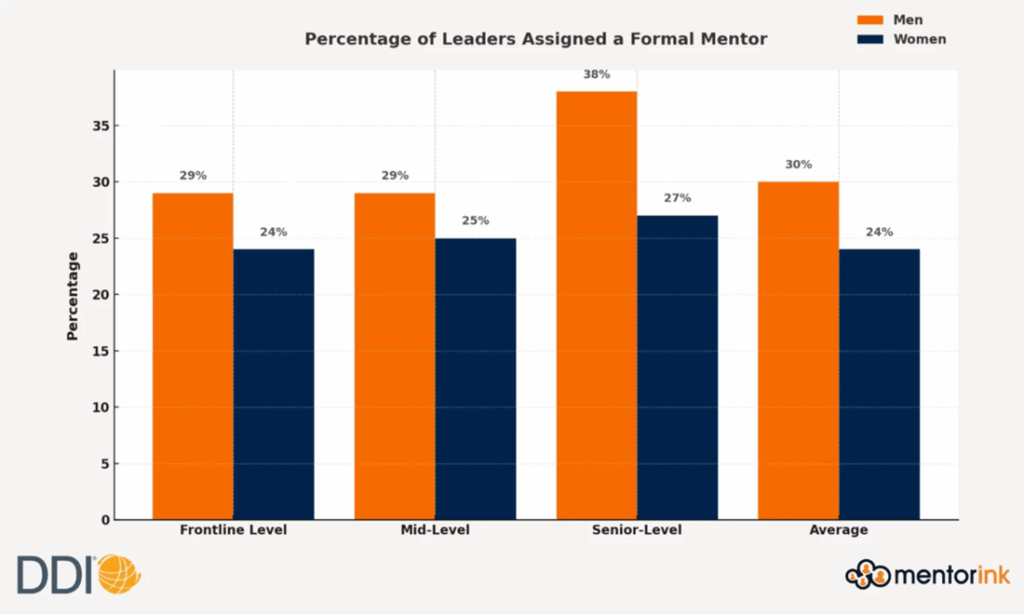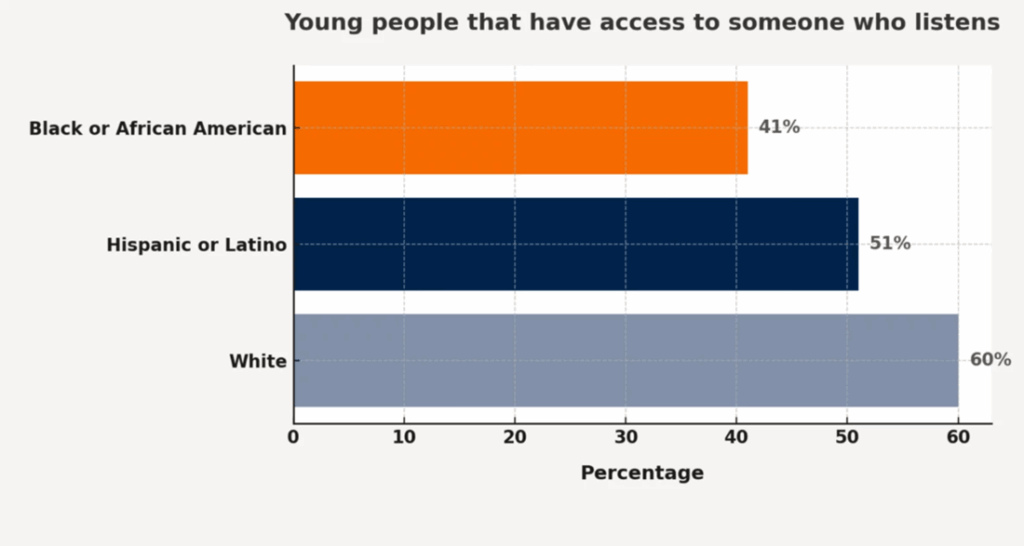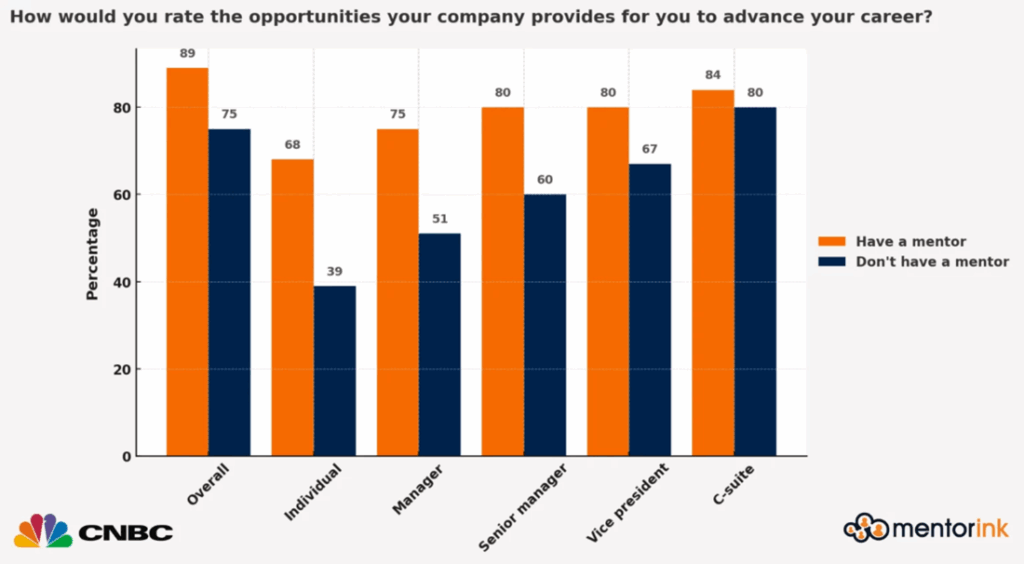The 2025 workplace is quickly evolving, with technology like the AI actively reshaping traditional roles and remote work being blurred, mentorship has become more than just a fancy perk – it is now a career and business imperative. As organizations strive to cultivate inclusivity, retain talent, and groom young employees into leadership roles, mentorship is a powerful means of driving individual and organizational success (Kitterman, 2025). This blog discusses why mentorship programs stand out as a game-changer for professionals at every level in 2025.
The Growing Importance of Mentorship in 2025
Today’s workforce is largely dominated by Millennials and Gen Z. These generations prioritize opportunities for advancement and learning, however, only 37% of professionals currently have a mentor, despite 76% recognizing its importance (Comaford, 2019). This gap highlights the need for structured mentorship programs to meet the demands of a growth-oriented workforce. With over 96% of Fortune 500 organizations implementing formal mentoring programs (Cantalupo, 2022), Mentorship has become a strategic priority.
Key Benefits of Mentorship for Career Growth
1. Enhanced Career Advancement and Promotions
Employees that are actively engaged in a Mentorship Program are five times more likely to be promoted than those without mentors. A study revealed that 25% of employees in mentoring programs experienced salary grade change, compared to only 5% in a control group without mentors (Klein and Cappelli, 2007). Having a mentor doubles the likelihood of intending to stay with an organization for more than five years (68% vs. 32%), among Millennials (Deloitte, 2016).
Mentors help mentees navigate career paths by setting goals, offering feedback, and connecting them with opportunities. For instance, 94% of mentored Millennials report receiving valuable advice from their mentors, which contributes to their professional growth (Deloitte, 2025; LinkedIn, 2019).

2. Skill Development and Knowledge Transfer
Mentorship programs facilitate the transfer of critical skills and institutional knowledge, enabling employees to perform better and prepare for advanced roles. A staggering 93% of Millennials believe skill development is crucial for career growth, and 83% of Gen Z want to learn skills to enhance their current job performance (Perna. C., 2021). Mentorship addresses this need by providing personalized guidance, with 82% of employees in mentoring programs reporting professional development as a direct result (Dimovski, 2023).
Reverse mentoring, where younger employees mentor senior colleagues, has also gained traction, particularly for bridging technological and generational gaps. For instance, 72% of DiversityInc Top 50 companies have reverse mentoring programs, which enhance innovation and adaptability (Kobie, 2022). This reciprocal learning fosters a culture of continuous improvement, benefiting both mentors and mentees.
3. Promoting Diversity and Inclusion
Mentorship is a powerful tool for advancing diversity, equity, and inclusion (DEI) in the workplace. Companies with formal mentoring programs see a 20% higher representation of diverse employees in leadership roles, and mentoring has boosted minority representation at the management level from 9% to 24% (Beheshti, 2019). For women and minorities, mentorship increases promotion and retention rates from 15% to 38% compared to non-mentored employees (Murray, 2025). For example, Mastercard’s Uplift program supports Black executives through group mentoring, enhancing career growth and DEI (Hyman, 2023)

Challenges and Solutions in Implementing Mentorship Programs
Despite their benefits, mentorship programs face challenges. Only 37% of professionals have a mentor, and 63% of women report never having had a formal mentor. Additionally, 79% of working women lack the confidence to ask for a mentor (Beecham, 2025). To address these gaps, organizations can:
- Use Thoughtful Matching Algorithms: Tools like Wisdom Share or ThinkLink (Newham, 2023) match mentors and mentees based on goals, skills, and interests, ensuring productive relationships.
- Promote Virtual Mentorship: With the rise of remote work, virtual mentorship has proven effective, maintaining engagement and accessibility.
- Train Mentors: Companies with effective mentors are four times more likely to provide specific skills training, enhancing program success.

The Future of Mentorship in 2025
As we move further into 2025, mentorship programs will continue to evolve, driven by technology and a focus on inclusivity. Backed by robust statistics – such as fivefold promotion rates, 91% job satisfaction among mentored employees (Wronski, 2019), and 20% higher diverse leadership representation, Mentorship is no longer a luxury but a necessity for career growth.
References:
- Beecham, A. (2025), “The Stack World Conference: CEO Sharmadean Reid on why every woman should have a mentor at work”, available at: https://www.stylist.co.uk/life/careers/sharmadean-reid-the-stack-world-conference-mentorship/715387 (accessed 11 July 2025).
- Beheshti, N. (2019), “Improve Workplace Culture With A Strong Mentoring Program”, Forbes, 23 January, available at: https://www.forbes.com/sites/nazbeheshti/2019/01/23/improve-workplace-culture-with-a-strong-mentoring-program/ (accessed 11 July 2025).
- Byham. M., T., Neal, S. and Rhyne, R. (2024), “Women in Leadership Statistics: Insights for Inclusion”, 6 March, available at: https://www.ddiworld.com/blog/women-leadership-statistics (accessed 11 July 2025).
- Cantalupo, G. (2022), “Does Mentoring Still Matter For Fortune 500 Companies?”, Forbes, 19 May, available at: https://www.forbes.com/councils/forbescommunicationscouncil/2022/05/19/does-mentoring-still-matter-for-fortune-500-companies/ (accessed 11 July 2025).
- Comaford, C. (2019), “76% Of People Think Mentors Are Important, But Only 37% Have One”, Forbes, 3 July, available at: https://www.forbes.com/sites/christinecomaford/2019/07/03/new-study-76-of-people-think-mentors-are-important-but-only-37-have-one/ (accessed 11 July 2025).
- Deloitte. (2016), The Millennial Survey – Winning over the next Generation of Leaders.
- Deloitte. (2025), Gen Z – Millennial Survey.
- Dimovski, A. (2023), “28+ Unbiased Millennials in the Workplace Statistics”, Go Remotely, 31 March, available at: https://goremotely.net/blog/millennials-in-the-workplace (accessed 11 July 2025).
- Hyman, V. (2023), “How a mentorship program for Black men is building up community and lifting voices”, MasterCard, 27 February, available at: https://www.mastercard.com/news/perspectives/2023/uplift-mentoring-program-for-black-men/ (accessed 11 July 2025).
- Kitterman, T. (2025), “5 Ways to Make Mentorship Programs Successful in 2025”, Great Place to Work, 19 February, available at: https://www.greatplacetowork.com/resources/blog/5-ways-to-make-mentorship-programs-successful-in-2025 (accessed 11 July 2025).
- Klein, K. and Cappelli, P. (2007), “Workplace Loyalties Change, but the Value of Mentoring Doesn’t”, Wharton, 16 May, available at: https://knowledge.wharton.upenn.edu/podcast/knowledge-at-wharton-podcast/workplace-loyalties-change-but-the-value-of-mentoring-doesnt/ (accessed 11 July 2025).
- Kobie, N. (2022), “‘Reverse mentorship’: How young workers are teaching bosses”, BBC, 14 November, available at: https://www.bbc.com/worklife/article/20221110-reverse-mentorship-how-young-workers-are-teaching-bosses (accessed 11 July 2025).
- LinkedIn. (2019), Workplace Learning Report.
- Murray, C. (2025), “Corporate Mentions Of ‘Diversity’ And ‘DEI’ Dropped 72% In 2025, Analysis Finds”, Forbes, 29 May, available at: https://www.forbes.com/sites/conormurray/2025/05/29/corporate-mentions-of-diversity-and-dei-dropped-72-in-2025-analysis-finds/ (accessed 11 July 2025).
- Newham, T. (2023), “Mentoring Tools: 15 Best Mentoring Resources for a Thriving Programme”, Think Link, 1 September, available at: https://www.think-learning.com/employee-engagement/mentoring-tools/ (accessed 11 July 2025).
- Perna. C., M. (2021), “Why Skill And Career Advancement Are The Way To Gen-Z’s Heart”, Forbes, 2 March, available at: https://www.forbes.com/sites/markcperna/2021/03/02/why-skill-and-career-advancement-are-the-way-to-gen-zs-heart/?sh=79c9925e22b5 (accessed 11 July 2025).
- Wronski, L. (2019), “Nine in 10 workers who have a career mentor say they are happy in their jobs”, CNBC, 16 July, available at: https://www.cnbc.com/2019/07/16/nine-in-10-workers-who-have-a-mentor-say-they-are-happy-in-their-jobs.html (accessed 11 July 2025).
